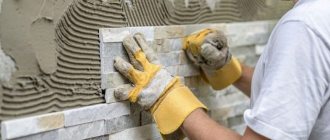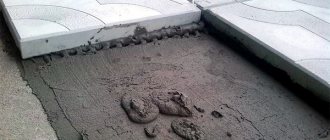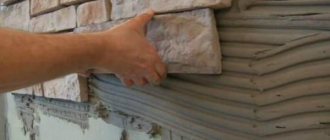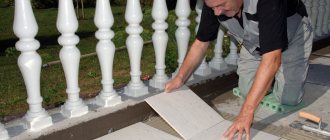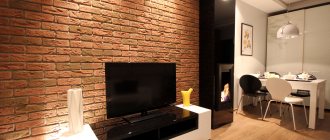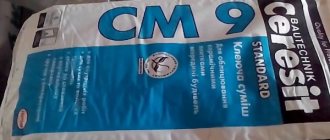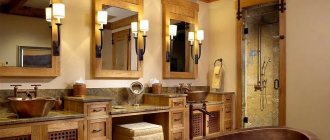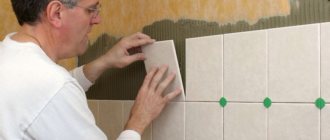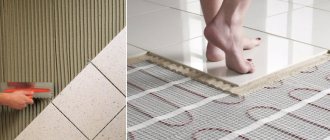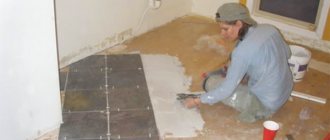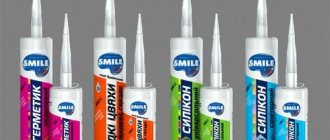Expert selection :
| Model | Price |
| 1. KNAUF Fliesen Plus | from 330 rubles |
| 2. Unis Plus GOLD | from 390 rubles |
| 3. Ceresit CM 11 PRO | from 200 rubles |
| 4. Weber Vetonit Profi Plus | from 570 rubles |
| 5. Ceresit CM 14 Extra | from 520 rubles |
Mini rating (updated in 2022)
Main types of tile adhesive
The range of tile adhesives on the shelves of construction stores is, frankly, impressive. The products are sold in the form of powders or ready-to-use pastes or liquids. Some types can be used without surface preparation. Others require a carefully executed underlay. Convenient universal products that simultaneously serve as grout between cladding elements.
Universal
The most popular option, which is used for finishing 10x10 - 15x30 cm. According to professional craftsmen, this is one of the best adhesives for all types of repairs, without any special “bells and whistles” or super tasks.
Reinforced
Used for installing 30x30 cm cladding materials on the floor or walls. Its main advantages are good adhesion to surfaces, as well as the ability to withstand prolonged loads: static and dynamic. The first refers to the weight of the furniture. Variable loads - the weight of people moving around the room.
Moisture resistant
The area of use of this adhesive composition is showers, bathrooms, swimming pools, car washes. The special features of the formula of this glue are its immunity to steam and moisture. Many brands contain additives against mold and mildew.
A special category is adhesive for laying transparent finishes based on white cement.
For outdoor use
Solutions designed for use on the outside of buildings are resistant to low temperatures and can withstand repeated freezing/thawing cycles. They are also used for cladding unheated rooms.
Peculiarities
When it comes to laying tiles outdoors, there is a need to use a special adhesive. Various requirements may be placed on it, which is determined by the peculiarities of the facing work and the conditions in which the object will be operated. But one thing remains unchanged: the glue must be frost-resistant. This requirement is dictated by the characteristics of the region in which we live. For all exterior work that requires the use of tile adhesive, a frost-resistant mixture is required.
This feature is achieved by adding additives to the composition. These components do not allow water molecules to expand under negative temperature conditions. With regular adhesive, water expands as it freezes, causing the coating to peel off, causing the tiles to come loose or develop cracks on the surface.
In addition to frost resistance, a number of requirements are imposed on the tile adhesive that is selected for exterior work:
- high strength indicators;
- high ability to adhere to various surfaces;
- resistance to deformation caused by exposure to negative temperatures.
Classification of tile adhesives by composition
Depending on the type of components, tile adhesive is usually divided into the following groups:
- cement-based adhesives;
- epoxy adhesives;
- dispersion compositions;
- polyurethane adhesives.
Let's look at them all in the table below.
Types of glue.
Type of glue Description
| Cement glue | Such adhesives are affordable - which is why cement is still popular as an adhesive material. In addition to it, the composition can contain polymer additives (the elasticity of the glue also depends on them) and sand. All three components ultimately provide the properties that cement adhesive is known for - resistance to water, elasticity and a high level of adhesion. Preparing the glue couldn’t be simpler – just pour it in, mix it and add water. However, there is a drawback to such ease - after pouring water, the glue begins to act and in the short time that remains, you need to have time to apply the material to the porcelain stoneware or wall and install it. |
| Epoxy adhesive | Recommended for use with facing materials that have a smooth base. It is considered a two-component composition - in addition to epoxy resin, the adhesive contains a catalyst. Preparation for use is considered quite simple, you just need to follow all the instructions on the instructions. Stable, strong, does not shrink. Expensive and difficult to install in cold weather. |
| Dispersion glue | Being solvent-free, the paste-like reinforced dispersion adhesive allows you to forget about the issue of the strength of the installed porcelain tiles due to the high tenacity of the mixture. Unlike the two adhesives listed above, this one is already ready for use, which means it does not need to be prepared. This glue is considered the most optimal option for use outside the house or inside apartments, because its high tenacity and strength allow it to withstand heavy materials. And you need to spend less of it. There is only one minus - high cost. |
| Polyurethane glue | The most diverse adhesive in terms of the number of components. It can consist of either one or two components. High resistance to heat, water and chemicals helps protect the material from destruction. Can be used both for heated floors and for installing material in places that frequently vibrate. |
Each of the four types of glue has its own pros and cons.
Why is the granite slab of the monument destroyed?
In order for a granite monument to last a long time, it is necessary not only to install it correctly, but also to protect it from external pollutants/precipitation, because everyone knows that “water wears away stones,” i.e. The monument, and the entire complex, must be covered with a “water repellent,” but Not every water repellent is suitable for these purposes, since it is necessary to maintain the vapor permeability of the material, because water stuck in the material, with a difference in temperature, will destroy the material. A coating from Tenax Proseal is perfect for these tasks (if you need protection without changing the color of the material). Or Ager, if you want to enhance the color of the material being processed.
How to choose adhesive for porcelain tiles
So, how to choose a good adhesive for porcelain stoneware material? A lot depends on how and when, that is, under what conditions the adhesive composition will be used.
Adhesive for porcelain tiles should be selected depending on the conditions of use
Table. The choice of adhesive composition depending on the conditions of use.
Conditions. Recommendations
| Presence of heated floor | If you decide to make your home as comfortable as possible and equip it with a floor heating system, you will need heat-resistant and highly elastic adhesive. Moreover, it is important that the packaging with the composition must indicate that it is compatible with this system. |
| Exterior decoration | When working outside, it is important to use an adhesive that is resistant to temperature changes and can also be used over a wide temperature range. It is best, of course, to install porcelain tiles in above-zero, cool, dry weather. And subsequently, after drying, the adhesive layer should not be afraid of excessive increases or decreases in temperature and should be frost-resistant. Only under such conditions will the finish last a long time. Finding such a composition in a store is not difficult - usually all the corresponding marks are on the glue packaging. There may also be a special marking - the letter F, opposite which is a number indicating the maximum possible number of freezing and defrosting cycles. And yes, glue used for outdoor work should not be afraid of exposure to moisture and even water. |
| Works from inside the premises | To perform indoor work, especially for domestic purposes, almost any composition can be used. However, do not forget to decide whether you will have a heated floor, and in which room you will be finishing. Two main parameters important for adhesives used indoors are resistance to moisture and heat. And yes, do not forget about environmental friendliness, especially if the composition will be used inside a living room - it must be safe for health. |
| Base material | Not every adhesive can be used effectively for installing porcelain stoneware coverings on any substrate. Most compositions are designed only for use on smooth and non-deformable surfaces (for example, concrete, cement). If you have a base made of a different material, then it is important to choose an adhesive that can be used on it. Otherwise, the finish will quickly become unusable, and everything will have to be done again. |
| Tile size | A very important parameter when choosing glue is the size of the finishing material. The larger the finishing coating element, the heavier it is, therefore the load on the glue will be higher in the second case than in the first. Be sure to decide what size tile you want to use before purchasing the adhesive. Depending on this, choose the adhesive composition, taking into account other requirements. By the way, when installing porcelain stoneware in different planes (floor, walls, ceiling), the load on the adhesive will be different. Take these values into account as well. The packaging with glue usually indicates the maximum permissible dimensional parameters of finishing materials for different types of rough base. If we return to the adhesion parameters, then for tiles with dimensional parameters less than 30X30, type C0 adhesive is needed (but for artificial and heavy porcelain tiles you should not take a composition less than C1), and for products with dimensions larger than 50X50 cm - C2. |
Rules of application
Using frost-resistant adhesives is not difficult even for beginners. The back of the package contains instructions for preparing and applying the glue.
Initially, a plane is prepared that will be lined. It must be thoroughly cleaned of dirt, dust, debris, and preferably primed. If there are visible defects, they must be eliminated.
The dry mixture is prepared strictly in accordance with the proportions.
Deviation from the instructions will result in loss of properties.
To prevent lumps from forming in the mixture, kneading is done with a drill with a special attachment. After stirring, the mass should stand for 5 minutes for complete swelling and dissolution of the components. After the time has passed, stirring is repeated.
To evenly distribute the layer over the tile, use a spatula or a serrated trowel. The thickness of the adhesive depends on the type of tile used and the preparation of the base. The tile with the applied layer is pressed against the plane of the base. Excessive glue is removed.
It takes a day for the layer to dry. Then it is permissible to grout the tile joints.
Interesting video on the topic:
Leading manufacturers
Various adhesive mixtures with which you can glue porcelain stoneware and ceramic tiles are produced by hundreds of domestic and foreign companies. In order not to study the range of each of them, experts advise giving preference to the most famous brands. They produce high-quality glue that ensures reliable fixation of floor or wall coverings.
Best manufacturers:
- KNAUF;
- Unis;
- Litokol;
- Ceresit;
- Weber;
- Perfect.
Glue mixture - what is it?
Typically, experts prefer to use dry construction adhesives, which are mixed with water to form a solution and then used for gluing tiles. The mixtures are sold in durable paper bags with protection; they do not contain lumps inside, but are a homogeneous small fraction of gray or white color.
The exact composition of the glue varies depending on the manufacturer, brand, and specific purpose. Usually it contains:
- organic, mineral substances - limestone, cement, quartz sand, cobalt sulfate, dolomite (give strength to the joint),
- polystyrene and other polymer additives (act as a frost-resistant component, serve to restore properties after diluting the mixture with water),
- thickeners and plasticizers (provide plasticity and elasticity of the seam),
- synthetic additives and some minerals, for example, magnesium, aluminum, calcium (necessary to increase moisture resistance and adhesion of the adhesive mixture),
- cellulose ether (gives the desired viscosity).
Universal and reinforced adhesives 2022
This category presents the best adhesive mixtures of reinforced and universal types. The former provide the most durable fixation, so they are often used for laying large-format tiles on wall surfaces. At the same time, universal compounds are recommended for fastening small-sized tiles.
KNAUF Fliesen Plus
This reinforced adhesive composition is suitable for vertical laying of porcelain, ceramic and stone tiles. The optimal base for it is concrete or drywall.
This mixture can be used for interior and exterior work. Among other good points, buyers note relatively low consumption, a long period of viability of the prepared glue and a short drying time. A pleasant addition for the buyer will be the simplest way to dilute the dry mixture with water.
pros
- Strengthened formula
- Versatility
- Small consumption
- Ease of use
Minuses
- Not found
Unis Plus GOLD
This universal adhesive will become indispensable when repairing rooms with different levels of humidity, and will also perform well when working outdoors. The mixture requires preliminary dilution with water. It has high frost resistance and resistance to various liquids. It is also worth highlighting the adhesive strength, thanks to which Unis Plus GOLD can be used for laying porcelain tiles (size up to 600 x 600 mm) on a vertical surface.
pros
- Versatility
- Fixation strength
- Wide operating temperature range
- Moisture resistance
Minuses
- Inconvenient packaging
Litokol Litoelastic EVO
This expensive adhesive is suitable for indoor and outdoor use. It can be used for fastening tiles made from a wide variety of materials, including porcelain stoneware.
This mixture is suitable for swimming pools and rooms with high humidity levels. In addition, it has sufficient heat and frost resistance, so it can be used at temperatures from -40 to +100°C. A nice addition will be the freedom to choose a base (concrete, brick, wood, plasterboard, metal), on which you can apply adhesive before laying the tiles.
pros
- Moisture resistance
- Wide temperature range
- Can be applied to any substrate
- Ease of use
Minuses
- High price
Mapei Kerabond T
This adhesive composition can be safely recommended for working with porcelain stoneware, as well as other heavy materials. Fits perfectly on both horizontal and vertical surfaces. Strict adherence to mixing technology will allow you to achieve a very viscous consistency, which will prevent the tiles from sliding along the vertical base. The mixture is able to perfectly withstand exposure to moisture; the temperature range is from +5 to +45 degrees Celsius. Hardening occurs within 45 minutes, which gives time for possible styling adjustments. The recommended price for store chains is 860 rubles per 5 kilograms.
pros
- Excellent work with massive slabs
- Countersacts high humidity
- Easy to apply
Minuses
- Not suitable for easily deformable surfaces
- Has a very high price
Litokol Litoflex k80
This mixture is considered universal and is produced on a cement base. It is recommended to use it not only for porcelain stoneware, but also for natural stone, and even for vinyl-based products. Perfect for finishing balconies and loggias, showers and saunas. It can also be used for exterior finishing of terraces and building facades. The composition is very elastic and has increased adhesion. Moisture-resistant, easily tolerates both high and low temperatures. The composition does not contain asbestos additives, which indicates environmental friendliness. Hardening does not occur very quickly, which gives time to adjust the styling. Recommended retail price – 470 rubles per 5 kilograms.
pros
- Apply in a thin layer
- Has the quality of frost resistance
- Features increased adhesion
Minuses
- Quite a high price
What to look for when choosing an MPC?
After hardening, frost-resistant adhesive must have maximum resistance to high humidity and low temperatures. These properties are of primary interest to consumers. They are provided by the quality of the antifreeze additive that is the main one in the mixture. If its effectiveness is low, there is no hope for the frost resistance of the MPC, as you yourself understand.
Frost-resistant glue
You should also pay attention to the content of special fillers and minerals in the dry mixture for gluing. There should be about 40 percent
Experts strongly advise buying MPCs that belong to the single-component group. This means that the composition will need to be diluted in certain proportions only with water, no other additional mixtures will be required.
In addition, it is advisable to pay attention to the following additional properties that the glue has. Feel free to buy the composition if it provides:
- absorbing the sound of footsteps and reducing sound conductivity;
- fast hardening;
- compensation for uneven surfaces on which the tiles are mounted;
- reducing the tension between the base and the material laid on it (the elasticity value of the composition is responsible for this characteristic - the higher it is, the better);
- high degree of waterproofing without the use of any other compounds.
Frost-resistant dry mixture
Never purchase dry mixtures with clearly visible dirt, foreign additives, or lumps that impair the homogeneity of the glue. The composition must be pure white or another shade specified by the manufacturer.
Be sure to read the instructions for the IPC. It clearly indicates what types of surfaces the mixture is suitable for. In most cases, the universal frost-resistant composition is suitable for cement screeds and surfaces, cellular concrete and its varieties, where there are light additives, gypsum plasters, and lime-cement bases. If there are any restrictions on the use of the adhesive mixture, they are always indicated in the instructions.
Heat-resistant and frost-resistant compounds 2022
This category contains the best heat-resistant and cold-resistant compounds. The former are not afraid of elevated temperatures, while the latter are not afraid of low temperatures. Both adhesive mixtures are excellent for outdoor work, and are also often used for finishing fireplaces, stoves, and large refrigeration units.
Ceresit CM 11 PRO
This dry adhesive mixture from the famous Ceresit brand is the leader in its category in terms of price and quality ratio. It is easy to mix, has good frost resistance and can be used in damp rooms.
CM 11 PRO ensures strong adhesion of porcelain tiles to the base. Among other important features, it is worth highlighting the relatively low consumption and long period of viability of the solution.
pros
- Ease of use
- Acceptable price
- High quality
- Long pot life
Minuses
- None
Weber Vetonit Profi Plus
Vetonit Profi Plus is a frost-resistant adhesive for porcelain stoneware and many other materials. This composition has optimal elasticity, but requires proper dilution with water before use. Among other features, buyers note moisture resistance, which allows the mixture to be used for outdoor work. The glue is resistant to bacteria and fungi, and also has a low dust formation coefficient and is consumed as economically as possible.
pros
- Low temperature resistance
- Small consumption
- Moisture resistance
- Resistance to fungi and bacteria
Minuses
- Hardens quickly
Perfecta Multifix
This adhesive from Perfekta is distinguished by its extended operating temperature range. Thanks to this feature, it is allowed to be used outdoors and inside buildings. Also, the mixture does not lose its characteristics even at high humidity levels.
Multifix is produced in the form of a powder, which is mixed with clean water before use (in the proportions specified by the manufacturer). The finished mixture has optimal consistency (if properly prepared), long pot life and is used economically.
pros
- Wide operating temperature range
- Versatility
- Heat and frost resistance
- Economical consumption
- Good price
Minuses
- May be difficult to find on sale
Ceresit CM 14 Extra
Quite a budget option, but perfect for installing porcelain stoneware slabs up to 50x50 centimeters in size. Its versatility lies in the possibility of application to any type of base, and it is also able to securely hold products on the wall. It withstands moisture and low temperatures well, so it is also suitable for outdoor use. When diluted, no harmful substances are released into the environment; it is absolutely safe for humans. It is possible to work with it in rooms with limited ventilation. Recommended cost: 410 rubles per 5 kilograms.
pros
- Good viscosity
- Environmental Safety
- Suitable for exterior decoration
Minuses
- It is recommended to work only on clean surfaces
Bergauf Keramik Pro
This material is characterized by increased seam elasticity. It is perfect not only for porcelain tiles, but also for other types of slabs, as it is capable of universally providing a high-quality connection of two elements. Its operating temperature range is very wide and ranges from -50 to +70 degrees Celsius. It can be used for exterior decoration and can easily be integrated into a “warm floor” system. It is moisture resistant, but this will require applying it in a thick layer. Primary drying occurs in 20 minutes, complete hardening in 18 hours. The recommended price for stores is 290 rubles per 25 kilograms.
pros
- Moisture resistant
- Has a wide temperature operating range
- Produces a high-quality elastic seam
Minuses
- Requires mixing in small portions
For laying on the floor, as well as on the wall of stone and mosaic Ceresit CM 115
White composition for fixing marble, natural stone, including light shades, as well as mosaic glass paintings on the wall and floor. It is better for specialist tilers to work with it; the solution dries quickly. The finished solution dries in 2 hours, the cladding can be adjusted a maximum of 25 minutes after installation. The time for rubbing the seams is after 1 day. The adhesion force to the surface is 0.8 MPa.
The glue is branded C1T, which determines its household use. It cannot be used for arranging floors where many people walk. It is not suitable for offices or public buildings; for such places it is worth choosing the C2 brand. Thin-layer, recommended layer up to 5 mm, in rare cases up to 10 mm is possible, but this is not advisable.
Resistant to water and frost, can be glued to heated screed, environmentally friendly. The best adhesive for finishing baths, for tiles in the bathroom. You can glue the finish to a gypsum base or lay gypsum tiles.
Ceresit CM 115 is suitable for external stairs, floors of balconies, terraces, for finishing swimming pools, wet and dry rooms in the house.
Pros:
- white;
- for light natural stone and mosaic;
- suitable for plaster;
- elastic;
- not afraid of water, frost;
- suitable for heated surfaces;
- durable.
Other types of adhesives 2022
Ceresit CM 14 Extra
This glue from the Ceresit brand attracts the attention of beginners and professional craftsmen. It is easy to prepare for use, has optimal viscosity and provides strong adhesion to porcelain tiles and other materials.
CM 14 Extra can be used in conditions of high humidity. Even at its maximum values, the mixture retains its properties and reliably holds the tiles on the floor or wall. It is also worth highlighting the wide temperature range, which allows the adhesive to be used for outdoor work.
pros
- Easy to prepare
- Moisture resistance
- Wide temperature range
- Good price
Minuses
- No
KNAUF Flex
This adhesive for porcelain tiles has become popular due to its moisture resistance and elasticity. It lays flat on concrete and drywall, ensuring strong adhesion of the tiles to the base. Flex is also distinguished by its low consumption. This makes it one of the best for people with limited financial means.
The glue receives a lot of good reviews from customers. The composition is praised for its ease of use, pot life for 3 hours and the absence of loss of adhesion properties over a long period.
pros
- Elasticity
- Moisture resistance
- Small consumption
- Lots of positive reviews
- Ease of use
Minuses
- Inconvenient packaging
Unis 2000
Unis 2000 is an adhesive composition that is recommended by experts for laying various types of tiles, among which is the porcelain stoneware we are considering. Suitable for both external and internal work. Due to its properties, the glue can withstand large sub-zero temperatures, which means it will not flinch in the face of severe frost.
Glue consumption is in the range of 3.75-5 kg per 1 m2. The value may vary due to tile size and weight, as well as weather.
pros
- Within three hours the solution is suitable for application
- Universal for any tile
- High resistance to moisture and frost
- High adhesive strength
- Dries quickly after application
- Suitable for correcting small and medium-sized unevenness up to 15 mm
Minuses
- It is necessary to apply quickly, despite the long “life” of the solution
Plitonit B
Plitonit is a Russian-German company producing construction chemicals for household and professional use. The cement-based dry mixture Plitonit B is used to prepare mortars used for laying ceramic and clinker tiles, as well as porcelain stoneware. The product also contains additives that increase its adhesion. The solution provides a high-strength connection for external and internal work. Can be used in wet areas, as well as for finishing swimming pools. The temperatures at which you can work with the solution range from 5 to 30 degrees.
pros
- Low price
- High level of elasticity
- Easy to prepare glue
- Wide range of uses
- Quick installation of cladding
- Good performance
- Excellent adhesion to surfaces
Minuses
- If the cladding technology is not followed, the tiles may lag behind the surface
Founds Starplix AC11
Dry moisture-resistant mixture based on cement. Used for external and internal finishing of floors and walls with ceramic tiles or porcelain stoneware. Can be used in rooms with high humidity. The solution can be used for 3 hours. Used for cladding the following bases:
- concrete (aged from 6 months);
- drywall;
- aerated concrete;
- gypsum fiber sheet;
- cement bonded particle board.
Main characteristics:
- cladding adjustment: 15 min;
- grouting – 1 day;
- layer thickness - 2-6 mm;
- operating temperature - 5-30 degrees.
pros
- Resistance to slippage
- Plasticity of the solution, ready for use
- Versatility
- Excellent adhesion
With high adhesion, can be used for KNAUF Flizen Plus ceiling tiles
The composition has excellent adhesion and adhesive strength to concrete of 0.8 MPa. The solution lasts up to 5 hours, the material can be adjusted up to 10 minutes. The seams are rubbed down after 24 hours. Quick-drying composition - dries in 2 days, completely hardens in 7 days. The substance is resistant to temperature changes, withstands from –45 to +80°C. Tolerates at least 25 freezing cycles.
Universal composition. Before applying KNAUF Flizen Plus requires preparation and cleaning of the surface. It should be dry. The glue has increased adhesion. Adheses well to concrete, cement screed, limestone, plasterboard, brick, and other substrates.
Recommended for tiles with a side of up to 30 cm and moisture absorption of no more than 3%, porcelain tiles 60x60 cm. Well recommended as an adhesive for PVC tiles, glass-magnetic sheets, finishing made of polystyrene foam, polyurethane, polystyrene foam, glass wool. The composition is also suitable for quartz vinyl tiles mounted on floors, for ceiling tiles made of lightweight materials (polystyrene, foam plastic), including in bathrooms.
Pros:
- elasticity;
- good adhesion;
- versatility;
- resistance to moisture and temperature changes;
- different bases;
- Suitable for a variety of finishes.
In general, about adhesive for porcelain tiles
Installation of porcelain tiles is a rather scrupulous procedure, primarily due to the characteristics of the material. Low moisture absorption forces us to look for elastic adhesives, since ordinary cement adhesives will not work here.
It is important to select adhesive for porcelain tiles taking into account many criteria.
The solution is the type of glue discussed in the article due to its ability to hold the material and not let water in. The choice of such adhesive depends on two parameters - where it is used and what features the tile has. We will consider them below.
Where to use glue
If you want to install porcelain tiles outdoors, then, logically, you need to look for an adhesive for outdoor use. Any other one won't do.
The street is a rather aggressive “environment” with its constant temperature fluctuations, various types of precipitation, exposure to UV rays and wind. Don’t forget about mechanical damage as a result of various types of events. Therefore, it is necessary to use not only a durable material in the form of porcelain stoneware, but also an adhesive that can firmly adhere the material to the surface and also withstand various aggressive influences.
Outdoor cladding requires the use of extremely durable adhesives
Don’t forget about such an interesting point as the location of the cladding on the street. Porch, plinth, concrete surface - each place needs its own approach, which means “its own” glue. For the porch, as a rule, water-repellent options are used, for the base - water-repellent with increased fixation. Any adhesive for exterior use is suitable for concrete surfaces.
Loggia, balcony, veranda - there will be a different approach here. Since they are located outside, but still attached to the apartment or house, the temperature there will be lower. For these places you need to take adhesives that are highly resistant to moisture and frost.
Resistance to various aggressive influences – that’s what a good glue should have
Finishing the inside is much easier - there are not a lot of all kinds of difficulties. But this does not cancel the rule of selecting glue depending on the location. In the bathroom, for example, you need moisture-resistant elastic adhesive. In addition, you need to seal the seams there with grout (waterproof, of course).
It is also worth using fungicidal glue for the bathroom - it will prevent the formation of fungus and mold. For the floor - glue with a plasticizer, which makes it more elastic. For walls - adhesive with a high level of fixation, which will withstand the high tensile loads caused by porcelain tiles.
Internal cladding is a simpler matter, but you still have to select the appropriate adhesive for each room
About the features of the tiles
Anyone who has experience in repairs knows the golden rule of fixing any tile - the thickness of the mortar = the thickness of the tile. This is the only way to achieve correct fixation.
Porcelain tiles and their markings: what do the pictures and numbers on packaging and catalogs mean?
However, thickness is not the main parameter of the tile. What is more important is the length and width, since as the size of the tile increases, its weight increases. And the heavier the tile, the greater the level of fixation the glue should have.
Let's take two tiles as an example. The first size will be, for example, 100x100, and the second, say, 300x300. The second tile is three times larger than the first, but they can both be fixed with universal glue. Large tiles are another matter. To hold it you need a more serious, reinforced glue.
The characteristics of the tile itself, and especially the dimensions, must be taken into account
The procedure for gluing stone
At the stage of preparation for the implementation of the idea, a powder is mixed with which a person will glue the granite monument to the base, a tool is laid out nearby, and in the process the following will be useful: a spatula, a solvent, a rag, a mallet. Before gluing two surfaces, the joint must be cleaned with any abrasive materials, then dust and dirt are removed as much as possible, after which the surface is degreased with a chemical agent and dried.
Using a spatula, you will be able to apply a perfectly even layer of the mixture, the main thing is not to overdo it, otherwise the excess will be squeezed out, and these drips will have to be scrubbed off for a long time. The next stage involves placing the parts in the correct position; after drying, if necessary, some areas are sanded with a special attachment on a drill or grinder.
Glue for marble and granite is one of the most reliable means that can hold stones of impressive size for many years. When choosing products, it is important to take into account the features of the product and not save money in order to be confident in the final result of the work. By adhering to the above tips, you will be able to avoid unscheduled repairs of monuments or decorative objects in the house during the entire life of the mineral, which eliminates unforeseen expenses of the family budget.
FAQ
Why do you need special glue?
The main reason why glue for large-format porcelain tiles must be specialized is the large weight of the material. Porcelain tiles are very dense and durable. In addition to this, the area of the slabs can reach very impressive values, for example, when we are talking about slabs up to three meters high. What glue can handle large-format porcelain tiles?
A composition with maximum adhesion to the base of the slab and elasticity is required. Be sure to familiarize yourself with the properties of the adhesive declared by the manufacturer. Remember - different types of glue are required for different rooms, types of substrates and operating conditions. In addition, there is a big difference between laying tiles on the floor and on the wall.
What are the requirements for adhesive for porcelain tiles?
Ceramic granite is a relatively recent “invention”. As soon as it appeared, it immediately became popular on the construction market, and therefore it is taken quite often. In terms of its properties, it can be compared with natural stone and ceramic tiles, and porcelain stoneware surpasses the latter in many respects.
Porcelain tiles are unique. A large number of colors, durability, high resistance to various influences, does not allow moisture to pass through - all this can be said about this building material.
Porcelain tiles are a truly interesting material for use in cladding.
Today, porcelain tiles are quite relevant. It is especially often used where a serious operational load is expected - pavilions, subways, all kinds of stations and airports, as well as warehouses.
Important! It is better to take only specialized mixtures. Then the porcelain stoneware will be fixed correctly.
Adhesives for porcelain tiles
Let's move on to the requirements that the adhesive purchased for laying porcelain tiles must meet.
- Level of water absorption of the material. It, as is already clear from the previously mentioned information, should be minimal. This is explained by the density of the structure of porcelain stoneware - a material that is unable to absorb either water or glue. In this case, you have to rely on special substances that increase the adhesion of the material to a level where it can absorb glue.
The structure of porcelain stoneware is dense
- Material hardness. Porcelain tile is a material that does not bend. At the same time, it is quite fragile in relation to the effects of temperature, as well as load. Porcelain tile adhesive must be resistant to cold or heat, as well as elastic to withstand the load that appears between the base of the porcelain tile and the outer covering of the wall or floor.
Important! Elasticity plays a doubly important role when it comes to a “warm floor” system.
- Stability of porcelain stoneware. With a material like this, you need to think about what kind of weather it will withstand and in what location. As a rule, when choosing an adhesive for exterior use, the number of cycles is inspected. A good adhesive for porcelain tiles with a high level of frost resistance will have a value of about 50 or even more.
Is it possible to level the walls, floor and ceiling with tile adhesive?
Initially, the adhesive for laying tiles was not planned to be used to level the surface, which means that this method of application is the result of folk ingenuity. We will mention several cases where glue can be used during alignment.
- Cracking of the screed due to incorrect technology for laying the material, as well as poor-quality composition of the adhesive previously used for laying the tiles.
- When the distance to the door opening is too short to use self-leveling mixtures.
- Partial peeling in several places throughout the room.
- Shedding of the top layer after pouring.
Not always, but in general, you can level surfaces with tile adhesive
However, leveling with glue has limitations, according to which this method may not always be successful. And this method is not capable of solving serious problems. In this case, it is better to use bulk mixtures - they are more reliable and durable.
Tips for choosing porcelain tiles
Consistency of tile adhesive - what should it be?
Each manufacturer of the adhesive composition decides for himself what the proportion for diluting the dry adhesive mixture and water will be. As a rule, the ratio is 20 to 5.
Preparation of tile adhesive
However, other ratio options that can be found on the packaging are not excluded. The changes are due to a different composition of the glue, for example, the presence of PVA or other components, which means you need to add more or less glue or water.
How much glue do you need?
There is a question that interests everyone who carries out facing work - how much glue should be used. For most manufacturers, the answer to this question can be found directly on the packaging. Another place to look for an answer is the instructions for use.
Important! The indicated numbers can be and even most likely will be very relative - in reality, expect different values.
Tile adhesive consumption rates per square meter
A number of conditions determine how much glue will be used.
- Type of glue. There are thick and liquid variations, each of them differs in its consumption indicators. For cement-based tile adhesive, diluted with water, the consumption is from one to two kilograms per square meter, which is quite normal.
- Tile type. Porcelain tiles absorb the least amount of glue, glazed tiles absorb a little more, and the most “gluttonous” are cotto and hand-made tiles.
- Laying surface. Ideally, it should be even and smooth, and then very little glue is needed on such a surface. The more porous the surface, the more adhesive mixture will be needed, since such material will absorb it.
Laying porcelain tiles on the floor
- Weather. Environmental conditions when working with tile adhesive should be quite optimal. The temperature, for example, should be around +18-25 °C. If the temperature is higher, then you need to add more mixture due to moisture evaporation. Temperatures below zero are not even considered at all - at them the glue loses its properties.
- Professionalism of the installer. The most important point in determining the glue consumption is the master himself. It determines how much glue will be used. His experience, installation technology, spatula used - all these “little things” directly affect the glue consumption.
Many factors influence glue consumption
Important! A V-shaped spatula is ideal for installation. It will be a little worse with a U-shaped spatula. It will be easiest to find a spatula with square teeth of different shapes.
Table. Glue consumption.
Tile side size in cm Trowel tooth length in mm Recommended adhesive consumption in kg/sq.m.
| < 5 | 3 | 2 |
| 5-10 | 4 | 2,5 |
| 10-20 | 6 | 4 |
| 20-30 | 8 | 5 |
| 30-40 | 10 | 6,5 |
| > 40 | 12 | 8 |
There is a nuance - when using this table, you need to take into account possible changes in the direction of increasing the glue layer.
Choosing reliable adhesive liquid nails - review of proven options
When choosing the most suitable brand of adhesive, consider the following:
- What materials need to be glued;
- What load will the adhesive seam experience?
- Under what conditions will the glued product be used (indoors or outdoors).
Today, the most popular among professionals are adhesive liquid nails from such manufacturers as: Moment (Henkel), Titebond, Makrofix, TYTAN, Krass, Kim Tec, Liquid Nails, Kraftool, Titebond, Quadro.
The following brands enjoy a very good reputation:
Glue Moment Installation MV 50 liquid nails is a universal moisture-resistant express adhesive based on water dispersion (polyacrylate).
Excellent for joining different surfaces (wood, styrofoam, metal, plastic, ceramics, chipboard, MDF, cork, foam, plaster, etc.) when carrying out installation work indoors and outdoors.
Ideal for gluing plastic and wooden skirting boards and other decorative elements, various profiles and panels indoors.
Liquid nail glue Titan Professional 901 is a heavy-duty construction and installation adhesive based on hydrocarbon solvents.
Provides strong and quick bonding of various types of surfaces (wood, metal, ceramics, concrete, plastic, stone, etc.). Resistant to temperature changes and high humidity.
Suitable for outdoor use (frost-resistant). Titanium Professional 901 is suitable for gluing heavy decorative elements and building materials.
Krass Extra-Strong - specialized liquid nails for express installation of plastic and tiles.
It is considered one of the best options for installing heavy and light elements made of plastic (polystyrene, PVC), chipboard, MDF, ceramics, plaster, plywood, stone, metal.
Suitable for use in damp areas, has excellent adhesion.
Comparison table of popular brands:
| Glue brand | Volume | Advantages | Price |
| Moment Installation MV 50 | 125 grams; 250 grams; 400 grams. | sets quickly, does not contain solvents, is white. | about 300 rubles per 400 grams. |
| Titan Professional 901 | 380 grams. | strong initial adhesion, forms an elastic seam, suitable for gluing heavy products. | about 100 rubles. |
| Krass Extra-strong installation | 300 grams. | It is convenient to apply on vertical surfaces, it is elastic, does not shrink, and has no odor. | about 200 rubles. |
Instructions - how to glue with liquid nails using the example of PVC panels
Most often, liquid nails are used to attach PVC panels to walls and ceilings.
This installation method eliminates drilling, and there are no traces of fasteners on the front surface of the panels.
How to glue PVC panels using KRASS liquid nails “Extremely strong installation”?
To do this you need:
- Pre-prepare the surfaces to be glued - they must be clean, dry and grease-free.
- Remove the protective cap from the tube, cut off the plastic tip closer to the thread.
- Insert the tube of glue into the mounting gun.
- Apply glue to the material to be glued in thin strips of equal thickness at intervals of several centimeters (depending on the weight of the product) or pointwise.
- Place the PVC panel against the wall/ceiling, press and fix for a few seconds. To adjust the position of the panel, do not peel off the material, but carefully move it. It is recommended to additionally fix heavy elements with the help of supporting structures until the glue dries completely (24-72 hours).
- Immediately after completing the work, the tools should be cleaned of glue with warm water.
VIDEO REVIEW
Answers to frequently asked questions
How to use a glue gun for liquid nails?
There's nothing complicated about it. You just need to insert the tube into the gun body, having previously pulled the rod out, and cut off the tip of the tube.
When the trigger is pulled, the rod moves, creating pressure on the piston inside the tube. In this case, the glue is squeezed out through the hole. The intensity of pressure regulates the supply of glue.
What is the consumption of liquid nail glue per 1m2?
The average consumption is about 200 grams of glue per square meter of decorative panels. When gluing narrow profiles and panels, the average consumption is 20-40 grams per linear meter.
How long does liquid nail glue take to dry?
The time for complete hardening of the glue is usually 24-48 hours (depending on the thickness of the glue applied), the setting time is usually 20-40 minutes.
Video - How to lay porcelain tiles
This is basic information, after studying which you can easily choose the optimal adhesive for porcelain tiles. If you have any doubts, you can always consult with specialists in the store.
The main thing is to choose a good retail outlet where experienced sellers work. We also recommend that before purchasing this or that composition, be sure to read detailed information about it on the Internet and customer reviews. This way you can form your own opinion about each composition even before purchasing and using it.
Why is the granite slab of the monument destroyed?
In order for a granite monument to last a long time, it is necessary not only to install it correctly, but also to protect it from external pollutants/precipitation, because everyone knows that “water wears away stones,” i.e. The monument, and the entire complex, must be covered with a “water repellent,” but Not every water repellent is suitable for these purposes, since it is necessary to maintain the vapor permeability of the material, because water stuck in the material, with a difference in temperature, will destroy the material. A coating from Tenax Proseal is perfect for these tasks (if you need protection without changing the color of the material). Or Ager, if you want to enhance the color of the material being processed.
Tips for laying tiles
- You can glue tiles to the floor from anywhere. It is still better to lay whole tiles rather than cut ones.
- You need to make lines to show where the tiles intersect.
- The surface is primed before applying the glue.
- The tiles are glued at the intersection of the tiles. Just start from there, no other places.
- Mix enough glue for one square meter. If you do more, it will be more inconvenient for yourself, because you will have to re-apply the glue due to its rapid drying.
- After installation, you need to level it so that the seams and surface are even.
- Carefully trim the tiles to remove excess.
Even without much experience, you can glue the tiles to the floor yourself, following the advice of the experts.
